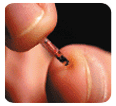Object of the future
The VeriChip™
What is it?
Current status of the Verichip™
VeriChip Corporation is the only company in the world today to apply this technology in its VeriMed and VeriGuard systems.
The VeriMed system caters to the needs of healthcare professionals as well as patients by using the implanted chip to provide secure access to patient records.
There were 98,000 deaths in the U.S. last year due to medical mistakes.
- American Medical Association
Communication barriers between patients and healthcare professionals due to impaired speech, memory loss, unconsciousness contribute to medical errors and lead to treatment delays. The Verichip™ ensures that healthcare professionals can access a patients name and critical information even under these circumstances using the chip's unique ID and a secure healthcare information database. You can find a video of CNN's coverage of this issue here.
The VeriGuard system offers the chip to organisations to aid with security issues by tracking their employees/assets and preventing unauthorised access.
Future status of the Verichip™
Although the usage of the Verichip™ is currently limited to these two applications, we can easily picture many more applications for such a useful technology in areas such as financial, key security, defense, homeland security and secure-access. The growth in this technology can be substantial as some of the biggest and well known hospitals in the US currently rely on this technology including the Stanford University Medical Center.
Oustanding issues
1. Privacy issues
One has the option to implant the chip into an item of clothing that can be removed when privacy is required. The information stored on the chip can be easily stolen however what is stored on the chip is determined by the user.
2. Security issues
The implant has been proven to be insecure. The chip can be cloned however one must get to within 1 foot of someone to do this.
3.Moral issues
Christian leaders speculate that this device is fulfilling a prophesy from the Bible where individuals are marked with the sign of the beast. And some religions forbid members to penetrate their bodies with foreign objects.
Conclusion
Although there are numerous controversial issues about this chip, we can see the enormous potential associated with it. Because of rather than in spite of these issues, I believe that the chip will evolve to a form which will satisfy the needs of users.
Additional information and References
What is RFID?
Radio Frequency Identification (RFID) refers to technologies that utilize radio waves to automatically identify individual items. When RFID first emerged, it was used in tracking and access applications. Since then, it has developed as a robust technology with ever increasing processing speeds, wider reading ranges, and larger memory capacities.
http://www.verichipcorp.com/content/company/1117572449
Wikipedia on the Verichip http://en.wikipedia.org/wiki/Verichip
